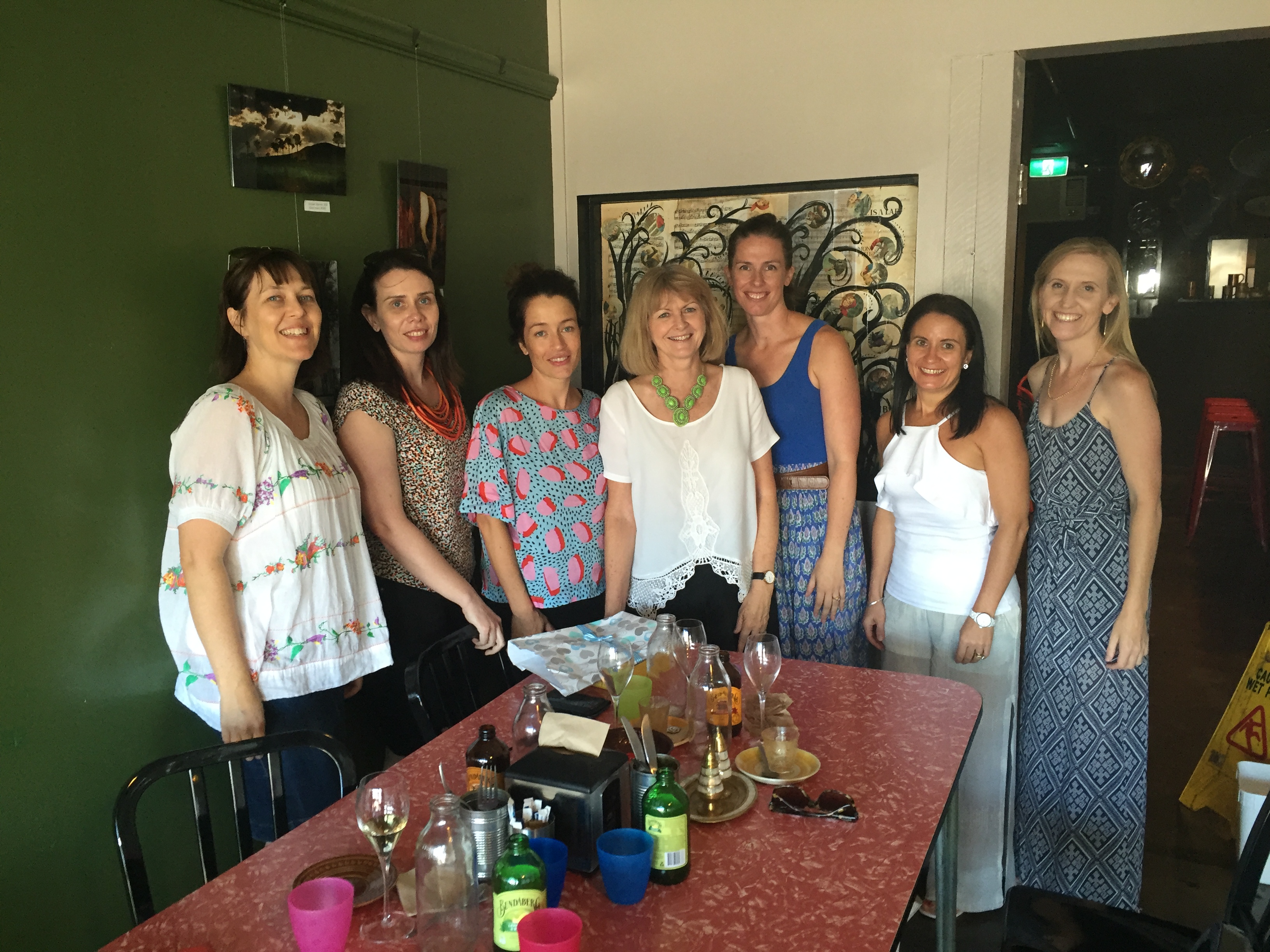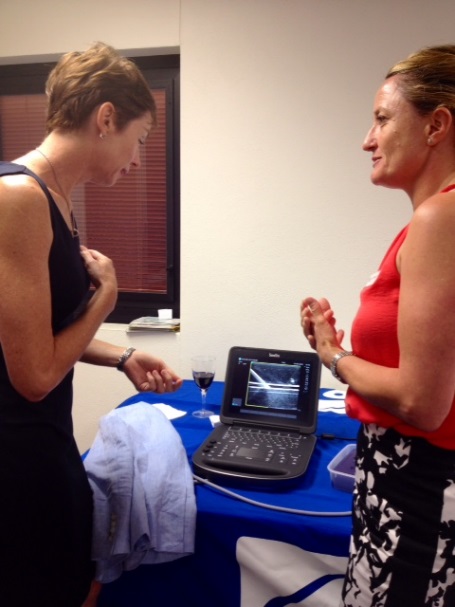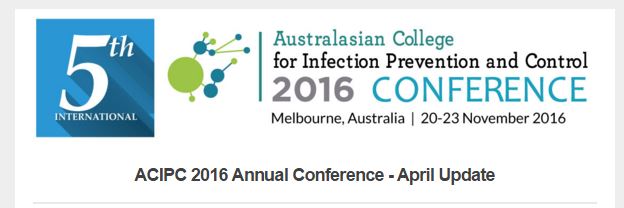| Welcome to the newsletter! So much has been happening with AVATAR this month. |
Firstly, AVATAR is becoming so large, we've decided it's
time to modify the underlying structure. The AVATAR Principal Director will now be a rotating position,
held for 2016-2017 by Dr Samantha Keogh who will will take over the administrative and strategic management
of the group while still coordinating her platform of Flushing and Blood Sampling. Professor Claire Rickard
has held the mantle for the past decade, but would like to step aside and concentrate on the dressing
and securement research portfolio and numerous ongoing trials in the area. Thanks, Claire, for your stellar
guidance, and welcome to the role, Sam!
AVATAR consists of 5 core platforms. These include:
-
Dressing and securement (Prof Claire Rickard)
-
Flushing and Blood Sampling
(Dr Samantha Keogh)
-
Devices and Therapy (Prof Marianne Wallis)
-
Infection
Prevention and Microbiology (Dr Li Zhang)
-
Education and Evidence Based Practice (Prof Marie
Cooke)
There are also several liaison positions: Clinical Trials (Nicole Marsh, Industry
Engagement (Amanda Ullman), and Communications (Dr Gillian Ray-Barruel). We welcome Dr Isabel Castillo
to AVATAR as a Research Fellow.
State chapters of AVATAR are now up and running. These will be
providing local vascular access education events and seminars. The chapter leads are as follows: Paediatrics
(Tricia Kleidon), NSW (Dr Evan Alexandrou), QLD (Nicole Gavin and Julie Flynn), WA (Peter Carr and Gavin
Jackson), SA (Dr Rebecca Sharp and Prof Adrian Esterman), and Victoria (Kerrie Curtis). Details are on
the AVATAR website.
The AVATAR Group has had a very busy and exhilarating past couple of months.
Coinciding with the inaugural Australian Vascular Access Society conference, we had our first AVATAR reunion
with all interstate members flying into Brisbane for the occasion. It was fantastic to put faces to names
and email addresses and share a few beverages to solidify our connections. Lots of plans and excitement
to keep moving forward.
Congratulations to all AVATARians who have had successful outcomes in the
past couple of months. Hearty congratulations to Amanda Ullman for receiving the Association of Vascular
Access 2016 Janet Pettit Scholar award and the Centaur Nursing Fellowship: well done, Amanda! Nicole Marsh
and Julie Flynn successfully completed their PhD confirmations last month and are now officially PhD candidates;
let the hard work begin! Dr Heather Reynolds and Dr Gillian Ray-Barruel were both successful in obtaining
travel grants from the Ian Potter Foundation. And finally, congratulations to Nurse Researcher Amy Spooner
and family who welcomed a little girl last month.
To find out more about our work, please visit our
website: www.avatargroup.org.au. |
New AVATAR Chapter in Victoria
|
|
It's time; the Victorian Chapter of the AVATAR Group has
begun.
I am very humbled to be amongst these inspiring researchers, leaders, students, academics
and other professionals in vascular access.
The aim in the coming months is to gather all the passionate
vascular access professionals throughout Victoria for a 'Meet and Greet' event. Watch this space as Victoria
is about to take off!
For further information, questions or suggestions, please don't hesitate to
contact me.
 Kerrie Curtis
Kerrie Curtis
Clinical Nurse Specialist | Day Oncology Olivia Newton John Cancer and Wellness
Centre | Austin Health
e: kerrie.curtis@austin.org.au
|
Australian
Vascular Access Society (AVAS) conference
|
|
| We had a very successful inaugural Australian Vascular Access Society (AVAS) conference in Brisbane
last month. Over 250 delegates attended and enjoyed lots of great presentations and discussions. Thank
you to the conference organisers for a terrific event! And thank you to our industry sponsors!
Professor André van Zundert from the University of Queensland opened the conference with an informative
and entertaining keynote session on the history of IV cannulation. André is now writing a paper
about this topic and would like to hear from anyone with an interest in this subject. If you are interested,
please email vanzundertandre@gmail.com
We were fortunate to have some amazing international keynote
speakers. Dr Vineet Chopra and Nancy Moureau (both from the USA) challenged the audience to compare the
evidence of choosing vascular access devices to real clinical outcomes, and question the shortfalls. We
have lots of evidence, but it's not always implemented. More certainly needs to be done in this area.
Professor Claire Rickard provided a thought-provoking keynote on the role of clinical guidelines in
vascular access. Despite the plethora or available guidelines, the device failure rate remains very high
worldwide. Claire suggested that perhaps it's time to consider a new approach to implementation of evidence
into practice. No solutions yet, just lots of engaging discussion and debate.
Dr Evan Alexandrou
and Dr Gillian Ray-Barruel presented the inaugural findings from the One Million Global peripheral intravenous
catheter (OMG) study. Over 40,000 PIVCs were entered in the database from 415 hospitals in 51 countries.
The main findings will be published soon, and individual benchmarking reports will be provided to each
participating hospital.
Professor Marilyn Cruickshank, Director, National Healthcare Associated
Infection, ACQHCS, discussed the current auditing of healthcare associated infection in Australia and
encouraged the audience to consider if perhaps it's time for a national standard and auditing program
for peripheral intravenous cannulas. The AVATAR Group already is considering this very possibility, following
the success of the OMG study.
Professor Adrian Esterman (University of South Australia) presented
a valuable and very well received session on how to appraise the critical literature. Jocelyn Hill (Canada)
gave an eye-opening talk on the challenges faced by home infusion nurses. Dahua Lan (China) reported on
the application of an analytic model to reduce vascular device failure, Azlina Daud presented the Malaysian
findings of the OMG study, and Matteo Tozzi (Italy) presented the results of a study in graft cannulation
for dialysis patients.
Hearing about the patient perspective was an invaluable addition to the
conference, and we would like to thank Karen Winterbourn for taking the time to come and speak about her
experiences with chronic vascular access needs.
The final session on Saturday was the Cochrane Corner,
chaired by Professor Joan Webster, with several short presentations by Nancy Moureau, Amanda Ullman, Nicole
Gavin and Peter Carr. The focus of this stimulating session was how to apply evidence to practice. All
speakers approached the topic from a unique perspective, which the audience found entertaining and a fitting
finale to an excellent conference.
Congratulations to Dr Li Zhang (Griffith University) who
was awarded Best Oral Abstract for her presentation, "Microbial Biofilms on Intravascular Catheters from
Paediatric Patients".
Excellent presentations were also delivered by Dr Rebecca Sharp (University
of South Australia), Kerry Taliaferro (Canberra Hospital), Professor Marie Cooke (Griffith University),
Dr Evan Alexandrou (Liverpool Hospital and Western Sydney University), Deb Rhodes (Alfred Health), Dr
Heather Reynolds (Griffith University and Royal Brisbane and Women's Hospital), Peter Carr (University
of Western Australia), Tricia Kleidon (Lady Cilento Children's Hospital), Amanda Ullman (Griffith University),
Nicole March (Royal Brisbane and Women's Hospital), Joel Mason (Sydney Children's Hospital), and Mari
Takashima (Griffith University). Thank you to all presenters (oral and poster).
We hope to see
you at the 2nd annual AVAS conference in Perth next May!

AVAS conference organising committee:
Therese Hallett, Prof Claire Rickard, Dr Evan Alexandrou, Tricia Kleidon, Dr Samantha Keogh, Peter Carr)
|
International
Nurses’ Day
|
|
Thursday, 12th May is International Nurses' Day. This year
we are supporting a fundraiser to raise desperately need funds for our colleagues at the CME hospital
in the Democratic Republic of the Congo. Griffith University Nathan campus hosted a morning tea and funds
raised will go towards the purchase of a new ambulance. If you would like to make a small donation to
this cause, please contact Jenny Chan, School Secretary, Nursing and Midwifery, Griffith University. Any
help will be hugely appreciated.


|
CASCADE trials at the LCCH
finished
|
|
The first of the two pilot trials, evaluating novel strategies to improve central venous access
device (CVAD) securement within paediatrics, have finished recruitment. After much hard work (including
our Clinical Research Nurse Victoria Gibson having twin boys!), there were many toasts and celebrations
to be had. These trials have already provided important feasibility data for the development of NHMRC
submissions, and have helped foster an improved focus on CVAD management at the Lady Cilento Children's
Hospital, Brisbane. Stay tuned for the results!

|
South Australia
Avatar Forum
|
|
Alliance for Vascular Access
Teaching and Research (AVATAR)
SA Forum
23rd February 2016
The South Australian branch of AVATAR were excited to hold
the inaugural vascular access forum recently at the University of South Australia - hosted by Dr Rebecca
Sharp and Prof Adrian Esterman.
The President of AVAS A/Prof Sam Keogh provided an overview of AVATAR/AVAS
and a snapshot of PIVC research. Dr Rebecca Sharp presented results from a project that examined the catheter
to vein ratio and risk of VTE in patients with a PICC.
Left to right: A/Prof Sam Keogh (AVATAR/AVAS) and Bronwyn Aberline (SonoSite)

Clinicians interested in vascular access
from a wide range of areas including paediatric dialysis, ICU, PICU, Radiology, Cystic fibrosis,
Respiratory/home oxygen and home care pharmacy services attended. Along with several researchers from
UniSA and industry representatives.
It was a great opportunity for clinicians, researchers
and industry to come together to discuss vascular access research and the use of research findings in
clinical practice. The evening concluded with group work to determine the hot topics in vascular access
clinical practice and research - with lively discussion about challenges associated with vascular access.
Then we had some fabulous SA wines!
Left to right: Doris Nash (Women's and Children's Hospital), Sue Sando (Bard) and Catherine Fawcett
(UniSA)

Two group members were so inspired by the forum that they will be starting research projects
at their hospitals US guided ABGs for home oxygen patient assessment and the use of the catheter to vein
ratio in patients with a CVC in ICU. We have started planning for the next forum based on feedback received
we will include sessions about critiquing the evidence to inform clinical guidelines and research methods.
We would like to acknowledge the sponsors, Rose Powell (Cook medical), Ray Main (Teleflex Medical),
Sue Sando (Bard), Mike Florey (FloMedical) and Bronwyn Aberline (SonoSite).
|
Upcoming conferences: Save
the date!
|
|
-
World Congress on Vascular Access, Lisbon, 22-24 June 2016
-
Association
of Vascular Access ASM, Orlando, 16-19 September 2016
-
Australian College for Infection
Prevention and Control annual conference, Melbourne, 20-23 November 2016
-
2nd Australian
Vascular Access Society conference / World Congress on Vascular Access, Perth, 11-12 May 2017
-
4th International Conference on Prevention & Infection Control, Geneva, 20-23 June 2017
|
Please, click on the picture for more information.

|
4th International Conference on Prevention & Infection
Control
Join us for ICPIC 2017 in Geneva from 20 to 23 June 2017!
We are looking
forward to welcoming you back to Geneva, Switzerland, for the 4th International Conference on Prevention
& Infection Control (ICPIC), to be held from 20 to 23 June 2017.
By now, ICPIC has become an
established entity in the field of international Infection Control and Prevention meetings, with an average
of 1000 participants from 100+ countries for the prior 3 meetings.
As a result, the 4th ICPIC
will also offer a unique forum for the exchange of knowledge and experience in the prevention of healthcare-associated
infections and control of antimicrobial resistance around the world. Unless (new) emerging infections,
posing a public health threat, arise, as it was the case during ICPIC 2015 with Ebola, the prevention
and control of antimicrobial resistance remains the foremost global threat confronting all countries alike.
Once again, ICPIC will provide the necessary platform to share knowledge and exchange experience with
regard to antimicrobial resistance and the prevention of healthcare-associated infections in general.
The current organizing/program committee now includes representatives from the European Society
for Clinical Microbiology and Infectious Diseases (ESCMID), the Society for Healthcare Epidemiology of
America (SHEA), the Asia Pacific Society of Infection Control (APSIC) and the Infection Control Africa
Network (ICAN) to mobilize even more world experts and key opinion leaders to share their knowledge and
expertise. ICPIC keynotes, symposia, Pro-Con debates, free-papers and meet-the-expert sessions will continue,
as will the unique and very popular ICPIC Innovation and Implementation Academies, and ICPIC video contests.
While retaining the elements that led to the success of the first three ICPIC summits, and continue to
boost the possibilities for exchange with your peers, we will surprise you again with new features, too.
We look forward to your active participation in the 4th ICPIC in June 2017, as well as to welcoming
you to Geneva please mark your calendars!
To discover more about ICPIC join us on facebook
or twitter and visit our website.
www.ICPIC.com
Didier Pittet
ICPIC Chair
Andreas Voss
Co-chair & Programme Director
Stephan Harbarth
Co-chair
|
Broadhurst D, Moureau N, Ullman AJ. Central venous access
devices site care practices: an international survey of 34 countries. J Vasc Access 2016; 17(1):
78 - 86
Ray-Barruel G. Consider the patient's voice. British journal of nursing
(Mark Allen Publishing). 2016;25(8):S3.
Ullman AJ, Cooke ML, Mitchell M, Lin F, New K, Long
DA, Mihala G, Rickard CM. Dressing and securement for central venous access devices (CVADs): a Cochrane
Systematic Review. International Journal of Nursing Studies, April 2016 doi:10.1016/j.ijnurstu.2016.04.003
Carr PJ, Rippey J, Moore T, Ngo H, Cooke ML, Higgins NS, Rickard CM. Why do emergency department
inserted peripheral intravenous cannulae get removed in admitted patients? A retrospective chart audit
in Australia. Infection Control and Hospital Epidemiology. Apr 2016 1: 1-3
Carr P, Rippey
J, Cooke ML, Bharat C, Murray K, Higgins NS, Foale A, Rickard CM. Development of a clinical prediction
rule to improve peripheral intravenous cannulae first attempt success in the emergency department and
reduce post insertion failure rates. The Vascular Access Decisions in the Emergency Room (VADER)
study protocol. BMJ Open. Feb 11 2016; 6(2):e009196.
To read them, please go to http://www.avatargroup.org.au/publications.html
|
|
|